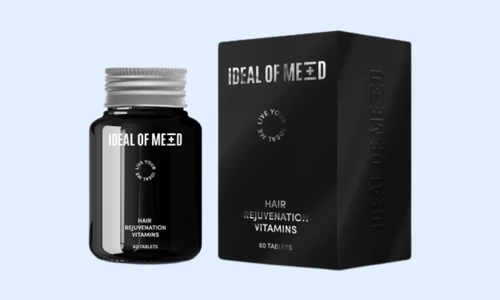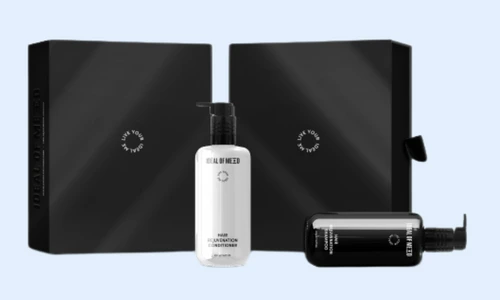Signs of Vitamin Deficiency in Hair
Last edited, 12 March 2024
Hair is not just a feature of aesthetics; it serves as a reflection of our overall health. The vibrancy, strength, and texture of our locks are intricately connected to the nutrients our body receives. Among these, vitamins play a pivotal role in maintaining the health of our hair, influencing everything from growth to moisture balance. Understanding the signs of vitamin deficiency in our hair is crucial for identifying potential health issues and taking proactive steps to address them.
In this comprehensive exploration, I will delve into the various indicators that your hair might be signaling a lack of essential vitamins. These signs serve as early warnings, providing valuable insights into the internal workings of your body. From excessive hair shedding to changes in texture and premature graying, each symptom tells a unique story about the nutrients your body may be lacking.
Table of Contents
Interpret the Signs of Vitamin Deficiency
As we unravel the intricacies of the relationship between vitamins and hair health, you’ll gain valuable knowledge to recognize, interpret, and respond to these signs effectively. By the end of this article, you will be equipped with the tools to nurture your hair from within, promoting not just a radiant mane but also a healthier you. So, let’s embark on this journey into the fascinating world of signs of vitamin deficiency in hair and discover the secrets to unlocking and maintaining the vitality of your tresses.
Excessive Shedding as an Early Sign of Vitamin Deficiency
Hair shedding is a natural part of the hair growth cycle, and it’s entirely normal for individuals to lose around 50 to 150 hairs per day. This process is a result of the hair follicles cycling through growth, rest, and shedding phases. Understanding what constitutes normal shedding is essential before identifying signs of excessive hair loss.
When the balance between hair growth and shedding is disrupted, it can be an early indicator of vitamin deficiency. Excessive hair shedding goes beyond the typical daily loss, and the hairs that are shed might be noticeably thinner at the root. Various vitamins are associated with maintaining the health of the hair follicles and supporting the growth cycle.
Examples of Specific Vitamins Associated with Hair Loss:
- Vitamin A: This vitamin plays a crucial role in the production of sebum, an oily substance that moisturizes the scalp. An excess or deficiency of vitamin A can disrupt the sebum balance, leading to hair problems.
- Vitamin D: Known as the “sunshine vitamin,” vitamin D is vital for creating new hair follicles. Its deficiency has been linked to hair loss, and ensuring adequate levels is crucial for overall hair health.
- Iron: Iron deficiency, often associated with anemia, can result in insufficient oxygen and nutrient supply to the hair follicles, leading to increased hair shedding.
Hi! I’m Alona, your expert in beauty and long-lasting vitality, especially when it pertains to hair health.
Feel free to connect with one of IdealofMeD’s specialists today! Don’t hesitate to reach out if you have any questions regarding our vitamins. We’re here to support on your journey to healthier, more vibrant hair!
- we are online
Dry and Brittle Locks: a Symptom of Vitamin Deficiency in Hair
The natural texture and moisture content of our hair are determined by various factors, including genetics, environmental conditions, and, importantly, the availability of essential vitamins. Healthy hair should possess a certain level of elasticity, shine, and resistance to breakage, indicating a well-maintained moisture balance.
Dry and brittle hair is a common manifestation of vitamin deficiency, signaling an imbalance in the nutrients necessary for maintaining hair health. When the body lacks specific vitamins, the hair shaft can become porous and lose its ability to retain moisture, leading to dryness and increased susceptibility to breakage.
Role of Specific Vitamins in Maintaining Hair Hydration and Texture:
- Biotin (Vitamin B7): Often referred to as the “hair vitamin,” biotin is crucial for the synthesis of keratin, a protein that forms the structural foundation of hair. Biotin deficiency has been linked to dry, brittle hair and hair loss.
- Vitamin E: Renowned for its antioxidant properties, vitamin E protects hair from oxidative stress. Its deficiency can contribute to dryness and compromise the overall texture of the hair.
- Vitamin A: In addition to its role in sebum production, vitamin A also helps maintain the moisture content of the scalp. A deficiency can result in dry and lackluster hair.
Multivitamins, the Ideal Solution For Those Suffering From Vitamin Deficiency
If you’re suffering from vitamin defiency I recommend simplifying your routine by ditching multiple pills. Our all-in-one hair vitamins, combines everything your hair needs for optimal health.
These tried-and-tested vitamins have shown fantastic results, speaking volumes about their effectiveness.
Link Between Slow Hair Growth and Vitamin Deficiency
The human hair growth cycle consists of three phases: anagen (growth), catagen (transitional), and telogen (resting). Understanding this cycle is crucial for recognizing deviations that may indicate slow or disrupted hair growth.
Optimal hair growth depends on a variety of factors, with vitamins playing a significant role. Vitamin deficiencies can disrupt the intricate processes involved in hair follicle development and the growth cycle, leading to slowed or stunted hair growth.
Examples of Key Vitamins Supporting Hair Growth:
- Vitamin D: Essential for the creation of new hair follicles, vitamin D ensures that the scalp has the necessary structures for robust hair growth. Its deficiency has been associated with hair thinning and slower growth.
- B-Vitamins (Biotin, B12, B6): B-vitamins are integral to the synthesis of red blood cells, which transport oxygen and nutrients to the hair follicles. Biotin, in particular, is renowned for promoting healthy cell division, crucial for the hair growth process.
How Vitamin Deficiency Can Alter Hair Texture
The texture of our hair is a reflection of its internal structure, influenced by the health of the hair shaft, cuticle, and underlying layers. Vitamin deficiencies can significantly impact these structures, leading to noticeable changes in hair texture.
Specific Vitamins Influencing Changes in Hair Texture
- Biotin (Vitamin B7): As a key player in the synthesis of keratin, biotin contributes to the structural integrity of the hair. Deficiency can result in a more brittle and coarse texture.
- Vitamin E: With its antioxidant properties, vitamin E protects the hair from oxidative stress, which, if unaddressed, can lead to changes in texture, making the hair more prone to damage.
Impact of Oxidative Stress on Hair Health
Oxidative stress, caused by an imbalance between free radicals and antioxidants in the body, can adversely affect hair texture. Vitamins with antioxidant properties, such as vitamin E, play a crucial role in mitigating oxidative stress and preserving the overall health and texture of the hair.
Recognizing shifts in your hair’s texture can serve as an early warning sign of potential vitamin deficiencies. In the upcoming sections, we will explore the intriguing connection between vitamin imbalances and premature graying, shedding light on how the color of your hair can provide valuable insights into your overall health.

How Vitamin Deficiencies Contribute to Premature Graying
While genetics certainly play a significant role in determining the color of our hair, premature graying often involves a complex interplay of genetic and environmental factors. Understanding this balance is crucial in identifying when premature graying may be linked to vitamin deficiencies.
- Vitamin B5 (Pantothenic Acid): Essential for hair pigmentation, vitamin B5 contributes to melanin production, the pigment responsible for hair color. Deficiency can lead to premature graying.
- Vitamin B12 (Cobalamin): Deficiency in vitamin B12 can affect the production of red blood cells, leading to inadequate oxygen supply to the hair follicles and potentially contributing to premature graying.
Vitamins, especially those within the B-complex group, play a crucial role in maintaining the health of hair follicles and supporting the production of melanin. When these vitamins are deficient, the normal pigmentation process can be disrupted, resulting in premature graying.
Understanding the connection between premature graying and vitamin deficiencies adds another layer to the intricate web of signals that your hair may be sending about your overall health. In the following sections, we will delve into practical steps you can take to identify vitamin deficiencies and address them effectively, promoting not just vibrant hair but also holistic well-being.
10 Other Ways To Recognize Vitamin Deficiency
Recognizing a vitamin deficiency involves paying attention to various signs and symptoms that may manifest in your body. Here are some general guidelines:
Fatigue and Weakness: Persistent feelings of tiredness and weakness can be indicative of several nutrient deficiencies, including vitamins.
Pale or Yellowish Skin: A lack of certain vitamins, such as B12 or iron, can result in pale or yellowish skin tone.
Hair and Nail Issues: Changes in hair texture, excessive hair shedding, and brittle nails may signal deficiencies in vitamins like biotin or minerals like iron.
Mouth Ulcers or Cracks: Vitamin C deficiency may lead to oral health issues, including mouth ulcers or cracks in the corners of the mouth.
Vision Problems: Vitamin A deficiency can affect vision, leading to night blindness or difficulty seeing in low light.
Muscle Weakness and Cramps: Insufficient levels of vitamin D and calcium can contribute to muscle weakness and cramps.
Bleeding Gums: Vitamin C deficiency is associated with bleeding gums and other oral health problems.
Digestive Issues: Certain vitamin deficiencies may cause digestive problems, such as diarrhea or constipation.
Joint Pain: Vitamin D deficiency has been linked to joint pain and stiffness.
Unexplained Weight Changes: Significant weight loss or gain without an apparent reason may be linked to nutrient imbalances.
If you suspect a vitamin deficiency, it’s essential to consult with a healthcare professional. They can conduct blood tests to assess your nutrient levels and provide guidance on dietary changes or supplementation if necessary. Keep in mind that these signs are general indicators, and a healthcare professional’s advice is crucial for accurate diagnosis and personalized recommendations.
Conclusion
In the intricate tapestry of health, our hair serves as a visible thread, reflecting the subtle interplay of nutrients within our bodies. The signs of vitamin deficiency in our hair are not merely aesthetic concerns; they are signals, urging us to delve deeper into our overall well-being. Understanding these signs empowers us to take proactive steps towards nourishing our bodies and cultivating vibrant, healthy locks.
From excessive hair shedding to changes in texture, slow growth, and premature graying, our hair communicates with us, providing insights into the state of our internal health. Recognizing these signs is the first step towards a journey of self-care and wellness.
Identifying vitamin deficiencies involves a multifaceted approach, considering dietary habits, potential medical conditions, and lifestyle factors. Armed with this knowledge, individuals can collaborate with healthcare professionals to pinpoint deficiencies accurately and tailor interventions for optimal results.
Addressing vitamin deficiencies for healthier hair involves a commitment to a balanced diet, targeted supplementation when needed, stress management, and thoughtful hair care practices. By adopting these measures, individuals not only enhance the health and appearance of their hair but also contribute to their overall well-being.
As we conclude this exploration into the fascinating realm of signs of vitamin deficiency in hair, let us embrace the opportunity to nurture our bodies from the inside out. Healthy, radiant hair is not just a testament to external beauty; it is a reflection of the care and attention we invest in our holistic health. May your journey to healthier hair be a stepping stone towards a more vibrant and resilient you.







